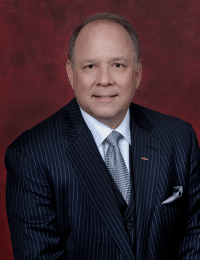Views of Mohamed El-Erian, Our Guest of Honor, on Markets, Economics and the Political Environment
For our first Thought Leaders Conference, we were pleased to have Mohamed El-Erian join us at the Hotel Irvine on February 18 to discuss his recently published book, The Only Game in Town: Central Banks, Instability, and Avoiding the Next Collapse.
Mohamed is the chair of President Obama’s Global Development Council and chief economic adviser at Allianz, the corporate parent of PIMCO, where he was previously the chief executive officer and co-chief investment officer. Foreign Policy named Mohamed to its list of Top 100 Global Thinkers for four consecutive years and as one of the 500 most powerful people on the planet.
Bottom Line Up Front
Mohamed thinks that in a multispeed world where, on one hand, the Federal Reserve is easing off the monetary accelerator while, on the other hand, the European Central Bank and the Bank of Japan are pressing down hard, it’s not clear what’s coming ahead. He thinks one thing is for sure: more volatility. It has been a wonderful ride for financial markets the last seven years, for which we have central banks to thank. But economic growth has been disappointing compared to previous recoveries, and it is doubtful monetary policy on its own can remain effective.
Mohamed believes if you want to navigate what’s ahead, make sure you develop three attributes:
Resilience: Stay in the game by not doing anything silly when markets get too volatile.
Optionality: Be flexible enough to change your mind as you get more information.
Agility: Be able to react quickly to take advantage of short-lived bargain opportunities.
We Are Headed Into A “T” Junction:
[dropcap]A[/dropcap]t the onset of the Great Recession, central banks felt compelled to intervene in financial markets beyond the conventional means of adjusting short-term interest rates. They expanded their policy menu with unconventional interventions like zero interest rates and quantitative easing to give political actors time to organize an appropriate fiscal response. They didn’t like manipulating markets, and they don’t like the extent to which financial markets have become disconnected from economic fundamentals, but the central banks simply were “the only game in town.”
In any case, the prospect that monetary policy can continue to sustain economic growth is uncertain. Mohamed believes the road we have been following is going to end within the next three years in what the British call a “T” junction: the road you were traveling ends, and you can choose one of two diverging paths.
Mohamed believes only one of the two paths is positive: that’s the path enabled by wide-ranging policy action to accelerate growth, create jobs, counter excessive inequality, and reduce risks of financial instability. The other path leads to even slower growth, persistently high unemployment, worsening inequality, and financial as well as political instability.
Rising inequality is an especially challenging political development with important economic implications. The “Wallets”, Mohamed’s reference for the rich, save more and spend less of their income gains than the “Wills”, his reference for the poor. So a larger share of income to the Wallets, all other things equal, will reduce aggregate demand across the economy since they will spend less than the Wills would have. The issue is not, according to Mohamed, whether to tax the rich and the successful or not. Yes, higher taxes may reduce incentives to work or invest, but, at some point, more income to the Wills will benefit the overall economy more than hurt it.
The better way out of the T junction requires the political willingness to follow that path. Politicians must reform taxation, invest in infrastructure, retool labor markets, support education and worker retraining, and address deepening indebtedness. The partisanship of the political environment in the United States and elsewhere that has paralyzed government action must be overcome. Otherwise the exit from the T junction will be along the lesser path. Mohamed gives an equal probability for each outcome, acknowledging it is hard to argue the political outcome will go one way or the other.
So what should we do as we near the T junction? According to Mohamed, we’ve got to be, first and foremost, very nimble. Do not commit your liquidity too early or too cheaply. Liquidity will be king until we get more clarity on how events are going to play out. Cash will be an important part of asset allocation, because it will help mitigate portfolio volatility when the usual correlations across asset classes may break down.
Second, understand that volatility is going to come back in a big way and understand how human behavior is affected by it. Try to build mechanisms that help you deal with it.
Third, remember that volatility can be an opportunity as well. Why? Because it allows you to make your purchases at lower prices. We expect lots of opportunities in the future caused by very unusual volatility events.
According to Dryden Pence: What About 2016? And What Does It Mean for Your Portfolio?
[dropcap]D[/dropcap]ryden expects that 2016 will be about three things: (1) the Consumer; (2) the Stock Picker; and (3) the Warrior.
The Consumer: With a strengthening labor market, stronger balance sheets, and savings from cheap oil, US consumers are in a better position than at any time since the Great Recession: they are able and willing to spend. Among the major sectors, Dryden likes consumer discretionary, technology, telecom, and healthcare.
The Stock Picker: Since we expect frequent bouts of volatility for the foreseeable future, we will expand the role of cash to mitigate risk and to be in the position to buy high-quality stocks when they go on sale. As Dryden has said about sell-offs, “People throw the baby out with the bathwater, and we want to be there to catch the baby.” Dryden expects the S&P 500 Index to be slightly up for the year, in which case dividends will be an important portion of the total return of our portfolios. We continue to emphasize high-quality dividend-payers this year.
The Warrior: Dryden strongly believes that US foreign policy will matter to economic developments and financial markets more than at any time in the last thirty years. Regional conflicts continue around the world and terrorist attacks have increased across Europe: we need clarity on what the US is going to do about it. How the US deals with global instability will change the course of global economic growth. After the election, either the US will act to reduce instability, or conflict and its depressing effect on economic activity will continue and spread. We’ve kept out of emerging markets to steer clear of this instability, and we expect to stay out until after the election.
Consistent with Mohamed’s assessment of the current market conditions, Dryden believes markets will remain susceptible to frequent and widened swings of volatility as the uncertainties of the current global environment resolve themselves. Since you can’t control the market or its volatility, you’re riding a rollercoaster if you’re invested in indices.
Dryden thinks portfolios should be actively managed in this environment, not left alone in buy-and-hold strategies. The way we’ll manage through the volatility is by increasing the role of cash, using it as a dampener on volatility’s effect and as a reserve to make opportunistic purchases. We will be tactical through the turbulence, and we will try to take advantage of market volatility, not be its victim.
We appreciate your trust and the opportunity to be of service.
All the best,

E. Dryden Pence III
Chief Investment Officer
LPL Financial Registered Principal
CA Insurance License # 0F82198

Ali Arik, Ph.D
Senior Analyst,
LPL Financial Registered
Administrative Associate
The opinions voiced in this material are for general information only and are not intended to provide specific advice or recommendations for any individual. All performance referenced is historical and is no guarantee of future results. All indices are unmanaged and may not be invested into directly.
The economic forecasts set forth in the presentation may not develop as predicted and there can be no guarantee that strategies promoted will be successful. All investing involves risk including potential loss of principal.
The payment of dividends is not guaranteed. Companies may reduce or eliminate the payment of dividends at any given time. Because of their narrow focus, sector investing will be subject to greater volatility than investing more broadly across many sectors and companies. The Standard & Poor’s 500 Index is a capitalization-weighted index of 500 stocks designed to measure performance of the broad domestic economy.










